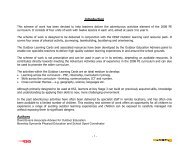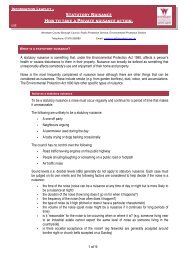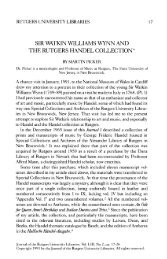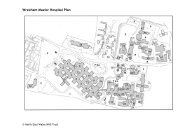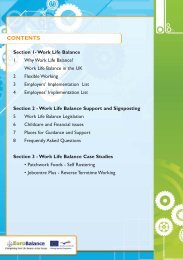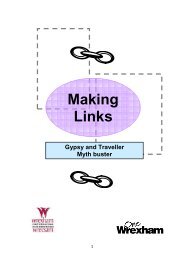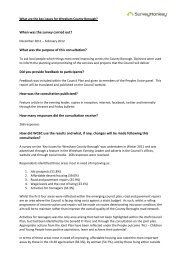Wrexham County Borough Council Procurement Strategy
Wrexham County Borough Council Procurement Strategy
Wrexham County Borough Council Procurement Strategy
You also want an ePaper? Increase the reach of your titles
YUMPU automatically turns print PDFs into web optimized ePapers that Google loves.
<strong>Wrexham</strong> <strong>County</strong> <strong>Borough</strong> <strong>Council</strong><br />
<strong>Procurement</strong> <strong>Strategy</strong><br />
1st August 2009<br />
- 31st July 2012
Contents<br />
1. Vision for <strong>Procurement</strong> Page 2<br />
2. Introduction / Background Page 3<br />
3. What do we mean by <strong>Procurement</strong> Page 4<br />
4. Structure of the <strong>Strategy</strong> Page 4<br />
5. Equality and Diversity Page 5<br />
6. <strong>Procurement</strong> Principles Page 6<br />
7. <strong>Procurement</strong> Aims Pages 7 - 16<br />
1
Our Vision for <strong>Procurement</strong><br />
<strong>Wrexham</strong> <strong>County</strong> <strong>Borough</strong> <strong>Council</strong> will demonstrate<br />
continuous improvement and the achievement of<br />
Value for Money through the effective procurement<br />
of its goods, services and works.<br />
To achieve this vision<br />
<strong>Wrexham</strong> <strong>County</strong> <strong>Borough</strong> <strong>Council</strong> will procure<br />
goods, services and works by the most efficient,<br />
sustainable and cost effective means to help ensure<br />
that its needs and those of the local community are<br />
met.<br />
This will be within a clear framework of<br />
accountability and responsibility that adopts legally<br />
compliant, best practice procurement procedures<br />
and techniques.<br />
2
Introduction<br />
<strong>Wrexham</strong> <strong>County</strong> <strong>Borough</strong> <strong>Council</strong>’s previous Corporate <strong>Procurement</strong><br />
<strong>Strategy</strong> was approved by the Executive Board in July 2006. Since that time,<br />
most of the key actions outlined in the <strong>Strategy</strong> have been achieved resulting<br />
in improved procurement practices and also an increased awareness of the<br />
impact that procurement can have on the cost and quality of services.<br />
This new <strong>Strategy</strong> takes greater account of local procurement issues,<br />
sustainable development, the new North Wales <strong>Procurement</strong> Partnership<br />
agenda and the Welsh Assembly Government’s efficiency agenda as well as<br />
directing and promoting professional procurement across the Authority.<br />
Background<br />
The <strong>Strategy</strong> continues to set the framework through which <strong>Wrexham</strong> <strong>County</strong><br />
<strong>Borough</strong> <strong>Council</strong> will ensure that its procurement activities deliver value for<br />
money and directly contribute to the achievement of its <strong>Council</strong> and<br />
Improvement priorities.<br />
It recognises that the procurement of goods, works and services has a major<br />
impact on many aspects of life in the <strong>County</strong> <strong>Borough</strong>, including the<br />
environment, carbon footprints, social factors and economic development.<br />
These are therefore reflected in the <strong>Council</strong>’s procurement policy, practice<br />
and improvement outcomes.<br />
<strong>Wrexham</strong> <strong>County</strong> <strong>Borough</strong> <strong>Council</strong> believes that services, supplies and works<br />
procured by the <strong>Council</strong> should be high quality, achieve value for money and<br />
above all be customer/user focused. In this regard the <strong>Council</strong> operates a<br />
‘mixed economy’ in relation to procurement. Goods, works and services can<br />
be delivered directly via in house provision, in partnership with other service<br />
providers or by contract through numerous external suppliers and contractors.<br />
In line with the Welsh Assembly Government’s aims “to continually improve<br />
the service by having regard to a combination of economy, efficiency and<br />
effectiveness,” the <strong>Council</strong> has agreed a minimum annual efficiency target for<br />
procurement of 1% of external expenditure. Whilst savings against this target<br />
have been delivered to date, the challenge to continually improve and deliver<br />
dictates that the <strong>Council</strong> must remain focused and professional to achieve this<br />
target whilst maximising its effectiveness and delivery of quality services.<br />
Effective procurement is fundamental to <strong>Wrexham</strong> and the delivery of value<br />
for money, community well being and sustainability through procurement will<br />
only be achieved by the adoption and practice of the procurement vision and<br />
aims promoted by this strategy.<br />
3
What do we mean by <strong>Procurement</strong>?<br />
<strong>Procurement</strong> is defined as ‘the process of acquiring goods, works and<br />
services, covering both acquisitions from third parties and from in-house<br />
providers. The process spans the whole cycle from identification of needs,<br />
through to the end of a services contract or the end of the useful life of an<br />
asset. It involves option appraisal and the critical “make or buy” decision<br />
which may result in the provision of services in-house in appropriate<br />
circumstances’.<br />
<strong>Procurement</strong> decisions for <strong>Wrexham</strong> <strong>County</strong> <strong>Borough</strong> <strong>Council</strong> will be made to<br />
deliver best ‘value for money’ outcomes for the Authority and will deliver<br />
results that ‘best serve’ the needs of the local community.<br />
It is vital that these services are delivered to a highest possible standard,<br />
within existing budget constraints and in ways that are responsive to the<br />
needs of users, stakeholders and the environment. This will therefore lead to<br />
a contracting process that affords the greatest value for the <strong>Council</strong>, the<br />
citizen and the local community.<br />
Structure of the <strong>Strategy</strong><br />
This <strong>Procurement</strong> <strong>Strategy</strong> sets out the priorities for procurement in the<br />
<strong>Council</strong> and will play a vital part in helping us to concentrate on areas that will<br />
maintain and build progression made during the life of the previous strategy. It<br />
draws together a number of elements, including:<br />
• An all-Wales approach to public procurement by working in<br />
partnership with the North Wales <strong>Procurement</strong> Partnership, the<br />
‘Value Wales’ Welsh Assembly Government initiative and other<br />
procurement representatives of the Welsh Public Sector.<br />
• The Welsh Assembly Government’s existing and developing<br />
agenda for public sector procurement.<br />
• The need to increase public sector efficiency and generate cost savings.<br />
• Advances in information technology and the associated electronic<br />
government targets.<br />
• The desire and obligation to improve front-line services.<br />
4
Equality and Diversity<br />
<strong>Wrexham</strong> <strong>County</strong> <strong>Borough</strong> <strong>Council</strong> recognises that individuals and<br />
communities may face unlawful and/or unfair discrimination on the grounds of<br />
their race or ethnicity, disability, gender, sexual orientation, age, language,<br />
background, physical or mental impairment, faith or belief, or physical<br />
appearance.<br />
As a major purchaser of goods, services and works, the <strong>Council</strong> recognises<br />
the opportunity to influence the equality agenda through procurement. The<br />
Local Government Equality Standard (1) has laid out specific “equality in<br />
procurement” criteria to be included in contracts and achieved through the<br />
procurement process. Even where a local government function is carried out<br />
by an external supplier, the <strong>Council</strong> retains responsibility for meeting the legal<br />
duty to eliminate unlawful discrimination, promote equality of opportunity and<br />
promote good relations between communities.<br />
The <strong>Council</strong> is committed to ensuring that our major suppliers and contractors<br />
share our equality and diversity vision and values, and work with the <strong>Council</strong><br />
to implement these. It is the responsibility of staff involved in procurement<br />
activities to ensure that equality is embedded in contracts and service<br />
provision. To ensure this, the <strong>Council</strong> will:<br />
• Ensure that procurement contracts and documents of enquiry contain<br />
appropriate contractual terms and conditions in relation to the equality<br />
and diversity agenda.<br />
• Ensure as necessary that appointed contractors share and help deliver<br />
equality objectives<br />
• Provide guidance in relation to equalities and diversity for those<br />
involved in the procurement process.<br />
(1) Equality Standard for Local Government (October 2007) Improvement and Development Agency (www.idea.gov.uk)<br />
5
<strong>Procurement</strong> Principles<br />
A number of key procurement principles have been established that are<br />
intended to support the <strong>Council</strong>’s core values and strategic objectives and the<br />
procurement vision. The <strong>Council</strong> therefore:<br />
• Is committed to ensuring value for money across all services by<br />
meeting the needs of local people in cost effective and efficient ways.<br />
• Believes that its employees are its most important asset and is<br />
committed to ensuring that it is a good employer. <strong>Procurement</strong> of<br />
services will take account of relevant Codes of Practice relating to the<br />
handling of workforce matters in Local Authority Service Contracts.<br />
• Recognises that procurement shall have regard to sustainability issues<br />
and shall give full consideration to integration of environmental and<br />
social factors in its procurement processes.<br />
• Is committed to the equality of opportunity throughout the <strong>Borough</strong>.<br />
• Requires that all procurement procedures should be operated in a<br />
professional manner to ensure the highest standards of probity,<br />
openness and accountability.<br />
• Recognises that effective project management of contracts is essential<br />
to achieve the completion of service delivery on time, within budget and<br />
in accordance with the specification.<br />
• Aims to encourage a mixed range of suppliers to compete for contracts<br />
to help develop a varied and competitive market place.<br />
• Will encourage the development of new and creative methods or<br />
approaches to procurement that will deliver contracts and services<br />
more efficiently, effectively and economically.<br />
• Recognises that where contracts run for a number of years, the<br />
contract should be sufficiently flexible to provide for continuous<br />
improvement throughout the contract period.<br />
• Recognises that to achieve efficiencies in the procurement process and<br />
to reduce transaction costs it will need to implement an appropriate e-<br />
procurement solution as part of the e-government programme.<br />
• Understands that effective delivery of procurement requires that<br />
Members and staff engaged in the process are suitably qualified and<br />
trained for the purpose<br />
6
<strong>Procurement</strong> Aims<br />
Section 1<br />
Supporting the Local Economy<br />
<strong>Procurement</strong> legislation does not allow the <strong>Council</strong> to simply favour small or<br />
local businesses over others. Its supplier selection and tender evaluation<br />
procedures must be transparent, non-discriminatory and based on best value.<br />
However it is possible to take sustainability and quality into account when<br />
service delivery options are being considered. Legislation allows factors such<br />
as carbon footprint, replacement cycles and social benefits to be taken into<br />
consideration wherever it is appropriate to the contract.<br />
The correct stage to address local sustainability issues is right at the beginning<br />
of the procurement process – during the formation of the business case and in<br />
the writing of the specification. In order to do this successfully those involved<br />
in the procurement and commissioning process need to be knowledgeable<br />
and familiar with what the market can offer in terms of added value and this<br />
can only come about by regular dialogue and consultation with providers and<br />
potential providers.<br />
To ensure the <strong>Council</strong> give appropriate opportunity and consideration to the<br />
local business community:<br />
• The <strong>Council</strong> is fully committed and supported to the principles of the<br />
Welsh Assembly Government’s Opening Doors Charter (2) and will fully<br />
apply all details of that Charter to help ensure that local small to medium<br />
size enterprises are given full opportunity to compete for and provide<br />
goods, services and works to the Authority.<br />
• In conjunction with the local Supplier Development Champion the <strong>Council</strong><br />
will engage with the local business community and aim to raise<br />
awareness of “how to do business with the <strong>Council</strong>”<br />
• The <strong>Council</strong> will seek to encourage, support and develop Small to<br />
Medium Size Enterprise (SME’s) markets where possible to maximise the<br />
local benefit of procurement opportunities, subject to compliance with<br />
relevant procurement regulation.<br />
• The <strong>Council</strong> will look to adopt whole life costing principles to major<br />
procurement activities, by recognising the impact on the social, economic<br />
and environmental well being within the <strong>County</strong> <strong>Borough</strong> locality.<br />
(2) Opening Doors, the Charter for SME Friendly <strong>Procurement</strong>. (Revised 2008) Welsh Assembly Government.<br />
(www.buy4wales,co,uk)<br />
7
Section 2<br />
Sustainability<br />
The <strong>Council</strong> recognises it has a vital role in furthering sustainable<br />
development, through its procurement of goods, works and services.<br />
<strong>Procurement</strong> decisions have a major socio-economic and environmental<br />
implication, both locally and globally, now and for future generations.<br />
In this respect the <strong>Council</strong> will therefore strive comply with the following:<br />
• Educate, train and encourage internal purchasers to review their<br />
consumption of goods and services, reduce usage and adopt more<br />
environmentally friendly alternative products.<br />
• Develop and communicate a sustainable procurement policy to all staff,<br />
suppliers and stakeholders.<br />
• Promote and embed best practice for sustainable procurement.<br />
• Work in partnership with other Local Authorities and Value Wales to<br />
maximise sustainable procurement gains.<br />
• Consider the costs and benefits of environmentally preferable goods,<br />
suppliers and services and build these as applicable into the<br />
procurement process.<br />
• Investigate opportunities for recycling, reduced usage, bulk delivery<br />
and better packaging.<br />
• Fully support the <strong>Council</strong>’s commitment to Small Businesses (the<br />
Opening Doors Charter)<br />
• Ensure that where appropriate and allowable, sustainability criteria are<br />
part of the supplier evaluation process and are used in the award of<br />
contracts.<br />
.<br />
• Address perceived barriers to the <strong>Council</strong> doing business with small<br />
business & the third sectors.<br />
• Comply with relevant legislation in relation to sustainability.<br />
• Support achievement of <strong>Council</strong> targets for sustainable improvement.<br />
8
Section 3<br />
Delivering the Efficiency Agenda<br />
While always a priority for the <strong>Council</strong>, the Welsh Assembly Government’s<br />
document “Making the Connections” (3) and the subsequent “Delivering the<br />
Connections” (4) Report means that identifying and delivering efficiency<br />
gains/savings will be a key driver for our procurement agenda.<br />
To measure efficiencies the <strong>Council</strong> will use the Value for Money<br />
Measurement System (5) initiated by Value Wales (<strong>Procurement</strong>) adapted and<br />
updated to suit the specific reporting requirements of the <strong>Council</strong>.<br />
It will also report on efficiencies delivered via six monthly updates to the<br />
Corporate Governance and Policy Scrutiny Committee and also by individual<br />
reports that may be requested by the Executive Board (e.g. In relation to the<br />
North Wales <strong>Procurement</strong> Partnership)<br />
To obtain these efficiencies the <strong>Council</strong> will focus on:<br />
• Collaboration: working with other public sector bodies and Value<br />
Wales (<strong>Procurement</strong>) to obtain better value from contracts by<br />
combining buying power and sharing the costs of tendering.<br />
• Standardisation: ensuring procurement processes and documentation<br />
are standardised throughout the <strong>Council</strong> to the maximum extent<br />
possible. For documentation, we shall utilise templates produced by<br />
Value Wales wherever practical.<br />
• E-<strong>Procurement</strong>: implementation of an electronic procurement system<br />
throughout the <strong>Council</strong> and using modern procurement tools such as<br />
Purchase Cards and eTendering to drive down process costs and tools<br />
such as eAuctions to drive down purchase prices. (see section 6)<br />
• Aggregation of Demand: we shall continue to analyse historical<br />
purchasing management information to identify areas where corporate<br />
contracts can bring better economies of scale.<br />
• Consolidation of Supply: by consolidating our requirements we shall<br />
aim to work with fewer suppliers, helping to ensure that those we do<br />
work with see us as an important customer and provide an appropriate<br />
level of service.<br />
(3) Making the Connections: Delivering Better Services for Wales (October 2004) Welsh Assembly<br />
Government.<br />
(4) Delivering the Connections: From Vision to Action (June 2005) Welsh Assembly Government.<br />
(5) Efficiency Measurement model / Benefits Reporting Model.<br />
(www.buy4wales.co.uk)<br />
9
Section 4<br />
Process Control and Framework<br />
European Union <strong>Procurement</strong> Directives and domestic regulation (most<br />
notably The Public Contracts Regulations 2006) as well as the Financial<br />
Regulations for <strong>Wrexham</strong> <strong>County</strong> <strong>Borough</strong> <strong>Council</strong> and other regulatory<br />
guidance set out the bases within which all procurement must take place.<br />
It is fundamental that there is openness and transparency in procurement and<br />
all processes that we employ or are to adopt must reflect this fact whilst still<br />
remaining responsive to the modernising agenda for the Welsh and UK local<br />
government.<br />
To deliver an effective purchasing and process control framework the <strong>Council</strong><br />
will:<br />
• Ensure adoption of procurement practices in line with legislative<br />
regulations and <strong>Council</strong> policy and work to maintain individual<br />
compliance in relation to these.<br />
• Monitor and measure procurement activity to ensure best practice,<br />
legal compliance and compliant spend issues are identified.<br />
• Ensure Financial Regulations and Procedures provide appropriate<br />
internal rules of control are reviewed to take account of any future<br />
changes in procurement practice e.g. electronic procurement.<br />
• Update and develop the <strong>Procurement</strong> Code of Practice to provide<br />
specific procedural guidance to <strong>Council</strong> staff. The document to be<br />
revised to take account of developing and emerging issues that are<br />
currently of focus within UK government and also to take account of<br />
those issues that are being brought to the fore by the current economic<br />
climate.<br />
• Provide enhanced visibility and access to major procurement contracts<br />
by preparing individual ‘Department <strong>Procurement</strong> Plans’ these to<br />
identify the possible contract opportunities for a period extending into<br />
the future of this strategy.<br />
• Produce a ‘Corporate <strong>Procurement</strong> Plan’, encompassing all major<br />
procurements that are due in the following 2-5 years.<br />
• Continue to develop our Contracts Register to ensure that there is<br />
awareness of the <strong>Council</strong>’s existing and future contractual<br />
arrangements. Ensure visibility of this is provided not only across the<br />
<strong>Council</strong> but also to external businesses who may wish to be considered<br />
for future opportunities.<br />
10
Section 5<br />
Capability, Development and Communication<br />
The <strong>Council</strong> will be open with all internal and external stakeholders in terms of<br />
how, when and why it is undertaking procurement activities. .<br />
It will therefore develop a specific communications plan to provide information<br />
to all officers of <strong>Wrexham</strong> <strong>County</strong> <strong>Borough</strong> <strong>Council</strong> as well as to current and<br />
prospective suppliers.<br />
The <strong>Council</strong> aims to provide equality of opportunity, and access to the best<br />
suppliers for the <strong>Council</strong>.<br />
To deliver and communicate effective delivery of procurement, including<br />
provision of information, guidance and opportunity the <strong>Council</strong> will:<br />
• Focus on providing information to all Companies in line with the ‘Selling<br />
to the <strong>Council</strong>‘ document. (6)<br />
• Provide visibility of our Contracts Register to all Suppliers. (see section<br />
4)<br />
• Ensure the <strong>Council</strong>’s principles of equality are incorporated in to<br />
procurement activity by ensuring suppliers / contractors satisfy all<br />
diversity requirements.<br />
• Ensure that all procurement activity with all potential providers is in<br />
accordance with best practice guidelines and relevant legislation.<br />
• Give opportunity for debrief to those who have been unsuccessful in<br />
our procurement exercises, to develop and make them better equipped<br />
for any future <strong>Council</strong> procurement exercise they may become involved<br />
in.<br />
• Ensure that internal communication (via the intranet, the Strategic<br />
<strong>Procurement</strong> Group and the <strong>Procurement</strong> Champions network) is<br />
developed and supportive of a corporate ethos for procurement being<br />
embedded across the Authority.<br />
• Continue to provide a training needs assessment and standardised<br />
training provision to raise the awareness of procurement issues and to<br />
deliver the desired quality of procurement across the organisation.<br />
• Provide initial training to Members as part of the Member training<br />
programme.<br />
(6) Selling to the <strong>Council</strong> Guide (March 2007) <strong>Wrexham</strong> <strong>County</strong> <strong>Borough</strong> <strong>Council</strong> (www.wrexham.gov.uk)<br />
11
Section 6<br />
Electronic <strong>Procurement</strong><br />
The <strong>Council</strong>’s Vision for E-<strong>Procurement</strong><br />
<strong>Wrexham</strong> <strong>County</strong> <strong>Borough</strong> <strong>Council</strong> will make best use of Information &<br />
Communication Technology (ICT) to reduce the cost of the procurement<br />
process for both the <strong>Council</strong> and its suppliers and contractors.<br />
E procurement is not seen as an opportunity to drive down prices at the<br />
expense of suppliers and contractors. Savings are anticipated from greater<br />
controls over ‘on-contract’ spending, reduced transaction and processing<br />
costs and appropriate discounts with suppliers and contractors who may<br />
receive high volumes of business from the <strong>Council</strong>. For staff across the<br />
authority, it is intended that e-procurement will be easy, secure and userfriendly.<br />
Whether by a fully integrated procurement system or the use of purchasing<br />
cards and online ordering systems, the chosen procurement method needs to<br />
integrate with the <strong>Council</strong>’s accounting systems to enable ‘real-time’ financial<br />
management of procurement expenditure. E procurement will mean that<br />
procurement management information is available. The detail of information<br />
(never previously available) will be directly used to help develop and improve<br />
services provided for the citizens of the <strong>Borough</strong>.<br />
Implementing Electronic <strong>Procurement</strong><br />
The Welsh Assembly Government (via the Xchangewales programme) (7) has<br />
set out to change the way local government works for and with its citizens.<br />
Electronic government is not an end in itself, but it is at the heart of the drive<br />
to modernise local government.<br />
E-<strong>Procurement</strong> <strong>Strategy</strong><br />
Through the application of e procurement the <strong>Council</strong> will achieve efficiencies<br />
in the procurement cycle especially for regular procurement activities. By<br />
improving the tools available, together with the use of purchasing cards the<br />
<strong>Council</strong> will add value to our current purchasing arrangements. It will<br />
communicate electronically with suppliers where possible as look to access<br />
appropriate e-Marketplace sites. The <strong>Council</strong> will look to implement new e-<br />
sourcing tools such as e-tendering and e-auctions. As these new facilities<br />
become embedded the <strong>Council</strong> will increase collaborative working and<br />
sharing of information with other Welsh Public Sector Bodies.<br />
(7) Xchangewales e procurement programme: Welsh Assembly Government (www.xchangewales.co.uk)<br />
12
All contracts will make provision for e-procurement processes to be used<br />
wherever practicable. The adoption of e-procurement will assist procurement<br />
activities to move from a devolved operational focus to a consolidated<br />
strategic approach. This in turn will consolidate spend and prevent duplication<br />
of processes and enable greater all-round visibility. This will facilitate and<br />
allow for the management of spend across the Authority to be scrutinised.<br />
The <strong>Council</strong>’s key aims for e procurement are:<br />
Development of a comprehensive e procurement infrastructure, which will<br />
deliver best practice e-procurement solutions for the <strong>Council</strong>.<br />
To map out the way forward on reforming and continuously improving the<br />
procurement function across the <strong>Council</strong>, whilst still reflecting the core values<br />
and corporate objectives. The <strong>Council</strong> therefore aim to: -<br />
• Respond to Welsh Assembly Government targets in relation to<br />
implementation of e-<strong>Procurement</strong>.<br />
• E-enable the ‘procure to pay’ cycle.<br />
• Encourage local business to trade electronically with the public sector.<br />
• Standardise procurement documentation and procedures.<br />
• Provide detailed management information and enable appropriate<br />
formation of best value, compliant procurement activity.<br />
To develop and implement our e procurement vision and aims the <strong>Council</strong> will:<br />
Evaluate alternative approaches to e-enabling elements of the<br />
‘procure to pay’ cycle.<br />
• Identify and evaluate e-procurement solutions which will widen the e-<br />
procurement capability of the <strong>Council</strong>.<br />
• Ensure that any such solutions and Business Cases are compatible<br />
with the <strong>Council</strong>’s overall strategies and policies.<br />
• Ensure that any such solutions include and provide efficiencies &<br />
benefits to back-office systems as well as traditional procurement<br />
activity.<br />
Introduce appropriate electronic procurement solutions including<br />
Portals / marketplace(s), quotations, tendering and auctions.<br />
13
• To introduce flexible e-procurement systems, which give appropriate<br />
consideration to the commodity being sourced and the associated<br />
supplier marketplace.<br />
• Work with the e-procurement solution providers (including the Welsh<br />
Assembly Governments Xchangewales team) and the market to deliver<br />
value for local taxpayers.<br />
• Support the growth and development of local small and medium sized<br />
enterprises (SMEs) through the <strong>Council</strong>’s e-procurement activity.<br />
• Support the third sector in order to build their electronic procurement<br />
capability.<br />
Use our Spend Analysis to target and focus on the key areas that<br />
will result in maximum effect and efficiencies from e procurement.<br />
• To identify key areas of spend and categorise them into groups<br />
appropriate to each e-procurement solution.<br />
• To target areas/categories, which will result in the maximum effect or<br />
efficiencies, dependent upon spend type and appropriate e-<br />
procurement solution.<br />
Manage and undertake the implementation process with due consideration to<br />
operational activities, change management issues, the national procurement<br />
agenda and any other factors that may arise through the transformation<br />
process. To do this the <strong>Council</strong> will:<br />
• Provide support and guide the evaluation/implementation process<br />
towards the solutions which will achieve maximum benefits.<br />
14
Section 7<br />
Collaboration<br />
<strong>Wrexham</strong> <strong>County</strong> <strong>Borough</strong> <strong>Council</strong> seeks to gain from sharing best practice<br />
and is committed to maximising opportunities for delivering better value for<br />
money through collaborative procurement arrangements.<br />
It recognises the value that appropriate collaboration with our public sector<br />
partners has in maximising economies of scale and buying power.<br />
To work actively to exploit the benefits from continued and new collaborative<br />
opportunities we will:<br />
• In collaboration with five North Wales Local Authorities seek to<br />
maximise the benefits of the North Wales <strong>Procurement</strong> Partnership.<br />
• Increase levels of financial benefit and service delivery by the delivery<br />
of collaborative contracts in line with an agreed work plan.<br />
• Participate fully (when deemed appropriate) in all Wales procurement<br />
initiatives instigated and managed by the Welsh Assembly<br />
Governments Value Wales team.<br />
• Give appropriate consideration to the increasing range of collaborative<br />
contract opportunities available to Public Sector Organisations via the<br />
Office of Government Commerce (buyingsolutions) and various other<br />
Buying Consortia.<br />
• Develop and manage a portfolio of collaborative common use<br />
framework agreements ensuring that appropriate promotion and<br />
adoption of those that provide best value takes place.<br />
• Work in partnership with other Authorities on relevant procurement<br />
issues to gain knowledge, share information and work to build any<br />
results obtained into our future procurement activity.<br />
15
Section 8<br />
Managing our Suppliers and Contractors<br />
The <strong>Council</strong> recognises the need to encourage a mixed range of suppliers<br />
that help to deliver best value for money via a varied and competitive market<br />
place. The <strong>Council</strong> is therefore committed to developing our arrangements<br />
with contractors and suppliers in a way that is appropriate to best practice<br />
procurement principles and where it provides the best outcomes.<br />
In addition the <strong>Council</strong> recognise that effective contract management will<br />
increase value for money and quality of service provided and we will strive to<br />
achieve and maximise benefits that sound contractual relationships deliver.<br />
To assist in ‘best practice’ management of our supply base the <strong>Council</strong> will:<br />
• Assess and evaluate our suppliers and contractors in line with criteria<br />
relevant to the contract being undertaken.<br />
• Ensure that relationship management of Companies and contracts is<br />
matched to the value and business risk of the purchase.<br />
• Consider financial strength, stability and other criteria considered<br />
relevant of companies in relation to suitability of ability to tender and /<br />
or in relation to potential award of business.<br />
• Evaluate and manage risk in relation of companies and related<br />
procurement exercises in accordance with the <strong>Council</strong>’s Risk <strong>Strategy</strong><br />
• Manage major procurement activity in line with the <strong>Council</strong>’s Project<br />
Management Toolkit and in line with the principles of the ‘Gateways’<br />
approval process<br />
16



